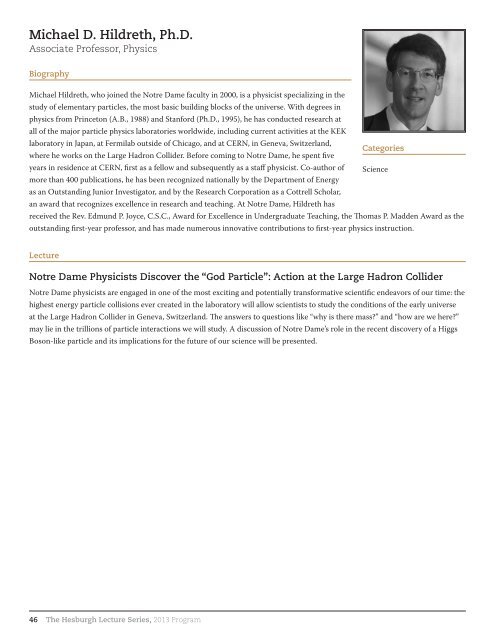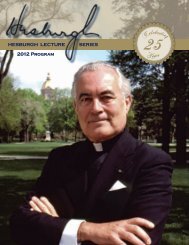HESBURGH LECTURE SERIES 2013 Program - Alumni Association ...
HESBURGH LECTURE SERIES 2013 Program - Alumni Association ...
HESBURGH LECTURE SERIES 2013 Program - Alumni Association ...
Create successful ePaper yourself
Turn your PDF publications into a flip-book with our unique Google optimized e-Paper software.
Michael D. Hildreth, Ph.D.<br />
Associate Professor, Physics<br />
Biography<br />
Michael Hildreth, who joined the Notre Dame faculty in 2000, is a physicist specializing in the<br />
study of elementary particles, the most basic building blocks of the universe. With degrees in<br />
physics from Princeton (A.B., 1988) and Stanford (Ph.D., 1995), he has conducted research at<br />
all of the major particle physics laboratories worldwide, including current activities at the KEK<br />
laboratory in Japan, at Fermilab outside of Chicago, and at CERN, in Geneva, Switzerland,<br />
Categories<br />
where he works on the Large Hadron Collider. Before coming to Notre Dame, he spent five<br />
years in residence at CERN, first as a fellow and subsequently as a staff physicist. Co-author of Science<br />
more than 400 publications, he has been recognized nationally by the Department of Energy<br />
as an Outstanding Junior Investigator, and by the Research Corporation as a Cottrell Scholar,<br />
an award that recognizes excellence in research and teaching. At Notre Dame, Hildreth has<br />
received the Rev. Edmund P. Joyce, C.S.C., Award for Excellence in Undergraduate Teaching, the Thomas P. Madden Award as the<br />
outstanding first-year professor, and has made numerous innovative contributions to first-year physics instruction.<br />
Lecture<br />
Notre Dame Physicists Discover the “God Particle”: Action at the Large Hadron Collider<br />
Notre Dame physicists are engaged in one of the most exciting and potentially transformative scientific endeavors of our time: the<br />
highest energy particle collisions ever created in the laboratory will allow scientists to study the conditions of the early universe<br />
at the Large Hadron Collider in Geneva, Switzerland. The answers to questions like “why is there mass?” and “how are we here?”<br />
may lie in the trillions of particle interactions we will study. A discussion of Notre Dame’s role in the recent discovery of a Higgs<br />
Boson-like particle and its implications for the future of our science will be presented.<br />
46 The Hesburgh Lecture Series, <strong>2013</strong> <strong>Program</strong>



